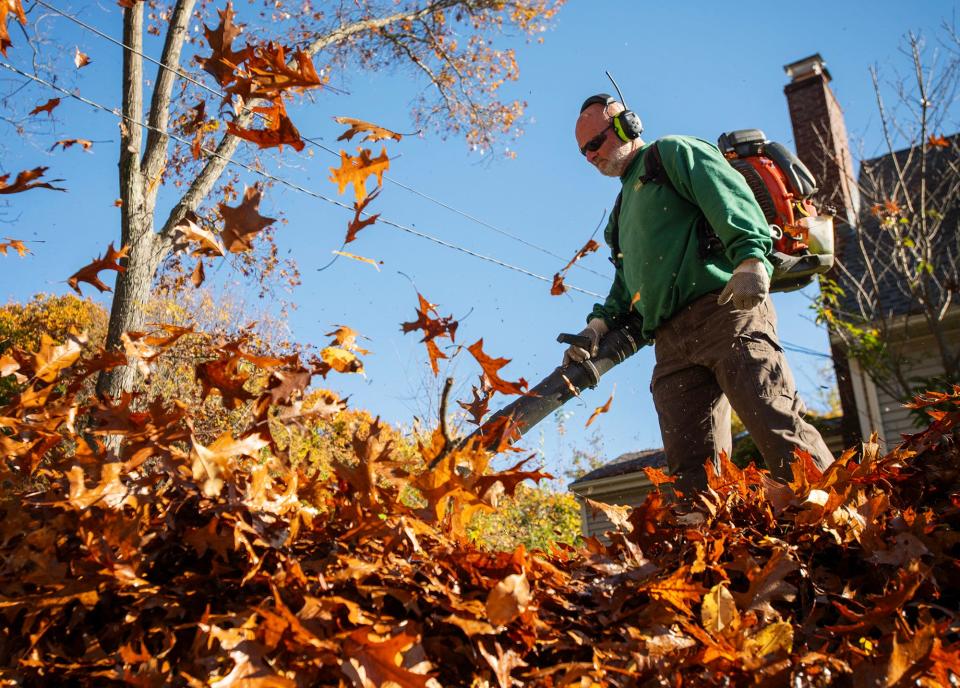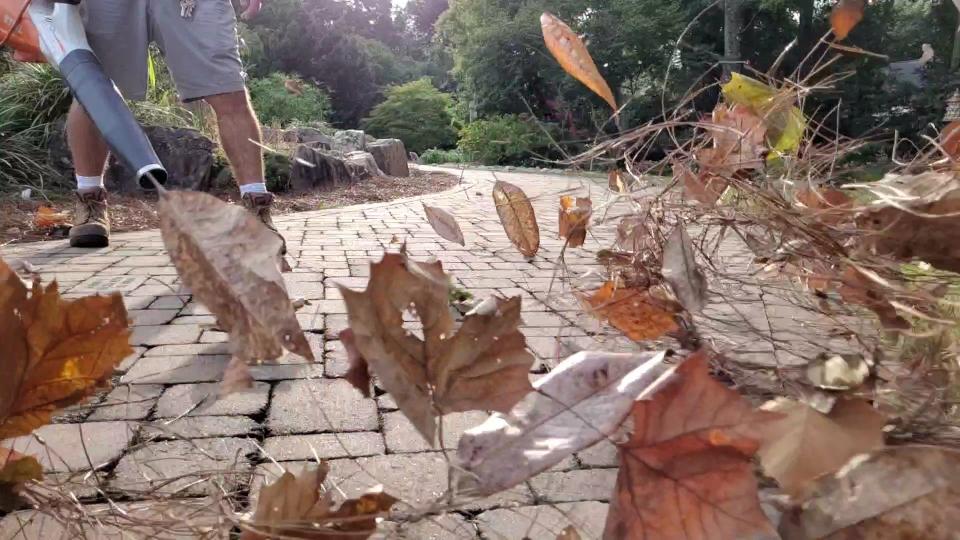Meet our Mid-Valley: Marissa Theve fights to eliminate noisy leaf blowers

Marissa Theve likes to walk and bike the tree-lined streets of her neighborhood, one of Salem’s oldest, located just north of downtown.
But all those trees come with leaves, and more often than not she’s accompanied by the high-pitched roar of landscapers at work.
“A lot of companies like the ones in my neighborhood are ‘mow and blow,’” she said, meaning workers use gas-powered lawnmowers, followed by gas-powered leaf blowers.
Theve, 35, is helping head up a new effort in Salem to encourage homeowners, businesses and state and local governments to switch to cleaner, quieter electric landscaping equipment.
Separately, she advocates for reducing light pollution.
“There’s more and more studies that show that light and noise pollution have detrimental effects on our mental health and our physical health, from less sleeping and chronic stress,” Theve said. “You could even go so far as calling this a public health effort.”

The volunteer group, called Quiet Clean Salem, has been meeting for about a year.
Members are conducting outreach presentations with the city’s neighborhood associations, reaching out to government officials and have provided testimony on proposed legislation.
“I see this as a way just to be good neighbors, knowing that Salem is getting denser and denser,” said Theve, who works as a soil scientist for the U.S. Department of Agriculture in Salem.
“We have to live closer together to maintain our urban growth boundary and protect soils and other resources outside of our urban growth boundary,” she said. “I think of light and noise pollution as two of the really low-lying fruits for making a space more livable for more people.”
Gas-powered lawn equipment emits more pollution than all Oregon cars
In addition to creating noise pollution, gas-powered lawn equipment emits air pollutants including fine particulates, ozone-forming nitrogen oxides and volatile organic compounds, and air toxics such as benzene, 1,3-butadiene and formaldehyde.
Exposure to those air pollutants has been linked to health problems including asthma attacks, reproductive ailments, mental health challenges, cancer and premature deaths.
Because they burn fossil fuels, gas lawn mowers and leaf blowers also emit carbon dioxide, the leading contributor to climate change.

Lawn and garden equipment in Oregon emitted an estimated 374 tons of harmful fine particulate air pollution in 2020, a new analysis of U.S. Environmental Protection Agency data shows.
That’s about the same as the amount of pollution emitted by 4 million typical cars over the course of a year, or more than all the cars in Oregon, according to the report, released Oct. 30 by Environment Oregon Research & Policy Center and OSPIRG Foundation. There are about 3.2 million passenger vehicles registered in Oregon.
"It's absurd that we have been tolerating so much harmful pollution and noise just to cut grass and maintain landscapes,” said Celeste Meiffren-Swango, state director with Environment Oregon Research & Policy Center.
“The good news is, for those who chose to not use a rake or other manual tool, cleaner, quieter electric-powered lawn equipment is capable, affordable and readily available," she said.
The report recommends that local and state governments use electric equipment on public property and provide financial incentives to encourage the widespread adoption of electric lawn equipment. It further suggests that cities and states consider restrictions on the sale and use of the most-polluting fossil fuel-powered equipment.
That’s just what Theve and Quiet Clean Salem are trying to encourage.
City, state moving toward electrics
Theve said she’s been involved in environmental causes since taking an AP environmental science class in high school. Theve grew up in eastern Connecticut, on a 7-acre property where, “We didn’t have a leaf-blower,” she said.
She earned a bachelor’s degree at University of Rhode Island and a master’s degree at University of Connecticut.
Theve moved to Salem in 2016 to take a job with the U.S. Bureau of Land Management. Earlier this year she moved to the USDA’s Natural Resources Conservation Service.
In addition to her work on light and noise pollution, Theve co-chairs her neighborhood association and has held leadership roles in the Oregon Society for Soil Scientists.
Theve said Quiet Clean Salem is part of a national movement encouraging a transition to electric-powered equipment.
The group is coordinating with Quiet Clean PDX in Portland. There’s also a national group forming, called Quiet Clean Alliance, she said.
“There’s all different takes that other cities are doing to transition to electric,” she said. “Some of them have funds to give companies to buy the electric equipment. Some cities have temporal restrictions, like you can’t do it on Sunday, or you can only use leaf blowers from November to January.”
The city of Salem doesn’t currently have any rules on the books.
But city officials said their staff are transitioning to electric equipment for city parks and streetscapes.
Urban forestry staff have been using battery-powered chainsaws, power pruners and leaf blowers, and the parks department is using battery-powered hedge trimmers, weed eaters, pole saws and handheld blowers to maintain local parks, spokesman Trevor Smith said.
“Crews have appreciated the benefits of using battery-powered equipment, like working without exhaust fumes, but some tasks still require the strength and reliability of gas-powered tools,” Smith said.
Still, he said, “A potential complete transition will depend on the availability and price of professional-grade equipment that meets the demands of the department.”
The Oregon Parks and Recreation Department has converted most leaf blowers, trimmers, weed eaters, chainsaws and mowers to all-electric, officials there said.
That includes at Oregon State Capitol State Park in Salem and nearby Silver Falls State Park.
“There’s a lot of benefits to the electric,” said David Figgins, park manager at the Capitol. “With electric you have a lot less maintenance. A lot less hazardous chemicals like oil and gas. They’re a lighter weight. And there aren’t the exhaust fumes.”
Tracy Loew covers the environment at the Statesman Journal. Send comments, questions and tips: tloew@statesmanjournal.com or 503-399-6779. Follow her on Twitter at @Tracy_Loew
This article originally appeared on Salem Statesman Journal: Quiet Clean Salem fights against gas-powered lawn equipment

